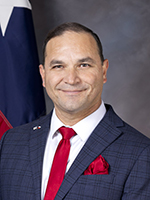Senator Adam Hinojosa: District 27
E-MAIL YOUR SENATOR
Click here to e-mail the Office of Senator Adam Hinojosa
Press Room
08/11/2025 ![]()
Senator Adam Hinojosa Secures Ten Commandment Posters for Schools
03/19/2025 ![]()
Senator Adam Hinojosa Celebrates Passage of First Bill SCR 13
03/04/2025 ![]()
Senator Adam Hinojosa Hosts Landmark Regional Meeting of Water Stakeholders
02/13/2025 ![]()
Senator Adam Hinojosa Votes For Historic Property Tax Cuts (SB4 and SJR2)

Occupation: CFO; Small Business Owner
Education: Del Mar College
Legislative Experience: Senate Member: 2025 - present
Hometown: Corpus Christi
Party: Republican
In addition to his work in public service, Senator Hinojosa is a dedicated small business owner, working alongside his brothers to manage and grow family-owned ventures in the Corpus Christi area. His experience as both an entrepreneur and a police academy graduate gives him a strong, practical understanding of the challenges facing working families and business owners across the state. Senator Hinojosa is deeply committed to creating new opportunities, promoting economic development, and ensuring the safety and prosperity of every Texan.
Above all, Senator Hinojosa is a devoted husband and father. He and his wife, Victoria, make their home in Corpus Christi, where they are raising their four children: Jaidyn, Dylan, Hudson, and Greyson. His greatest pride is his family, and the love he has for them drives everything he does in business, in public service, and in his daily life.
E-MAIL YOUR SENATOR
Click here to e-mail the Office of Senator Adam Hinojosa
Press Room
08/11/2025 ![]()
Senator Adam Hinojosa Secures Ten Commandment Posters for Schools
03/19/2025 ![]()
Senator Adam Hinojosa Celebrates Passage of First Bill SCR 13
03/04/2025 ![]()
Senator Adam Hinojosa Hosts Landmark Regional Meeting of Water Stakeholders
02/13/2025 ![]()
Senator Adam Hinojosa Votes For Historic Property Tax Cuts (SB4 and SJR2)
Office Information
| Capitol Address | District Address |
|---|---|
|
The Honorable Adam Hinojosa P.O. Box 12068 Capitol Station Austin, TX 78711 (512) 463-0127 (TEL) |
Webb Martinez Building 1324 E. Madison Brownsville, TX 78520 (956) 542-2211 (TEL) (956) 542-2221 (FAX) |
| District Address | District Address |
| 1211 US Highway 181 Portland, TX 78102 (361) 643-0026 (TEL) |
700 FM 3168 Raymondville, TX 78580 (956) 447-1094 (TEL) |
| District Address | |
| 255 S. Kansas Ave Weslaco, TX 78596 (956) 447-1094 (TEL) |
Committee Membership
District Analysis: District 27
- District Profile: Population, Households, Education, Employment, Income and Analysis
- Population Analysis
- Precinct and Districts
- Cities and Census Designated Places
- School Districts
- General Election Analysis
(Click the map to view a detailed district map in PDF format)


![[District Map]](_assets/img/distmaps/district-27-map.png)
